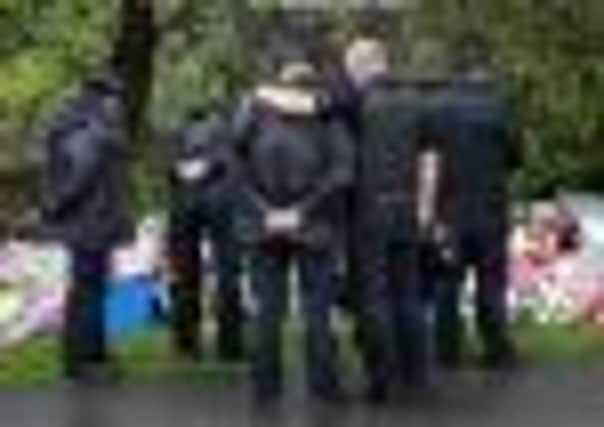Anna Burnside: Why we need to value the police


West Yorkshire chief constable Norman Bettison was under pressure to resign, to apologise properly, to wave a magic wand and instantly change the institutional problems that led to the heartbreaking events of 15 April 1989. By Tuesday evening, as we absorbed the events that led to the murder of PCs Nicola Hughes and Fiona Bone, much of that was forgotten as the nation mourned two unarmed officers ambushed in a gun and grenade attack.
Then, on the morning David Cameron was making a sympathy visit to the PCs’ bereaved families, it transpired that his chief whip, Andrew Mitchell, lost his temper with officers who refused to let him cycle through the gates at Downing Street. During his rant, he allegedly swore and referred to one armed officer as a “pleb” and a “moron”.
Advertisement
Hide AdAdvertisement
Hide AdCameron, who was touched by the deaths of two female officers in the line of duty, was furious at what looked like a gratuitous display of snobbery and misplaced entitlement.
Clearly we have mixed feelings about the boys and girls in blue. For some they will always be a class enemy – Thatcher’s enforcers from the miners’ strike; agents of the state who do their bosses’ bidding. For Mitchell they seem to be annoying mosquitos, preventing him from getting on with running the country.
They do a job that most of us would not choose to do, yet we expect them to do it cheerfully, consistently, following procedures and regulations to the letter. Except, of course, in exceptional circumstances which they should be able to recognise and respond to on the double, and use their own initiative to deal with. Mitchell thought he was above the petty constraints of Downing Street security procedures and wanted the officers to bend the rules for him. It is to these officers’ credit that they stood their ground as the chief whip – who is responsible for party discipline – blustered on.
We ask the vast majority of our police force to do all of this unarmed, in an era where it seems that the Manchester gang bosses of this world have easy access to handguns, bullets and grenades. The deaths of Hughes and Bone have revived the debate about arming the police force, even though these two officers, investigating a routine burglary, would not have had time to draw their weapons before their killer’s arsenal was unleashed upon them.
Most senior officers agree that giving everyone guns would fundamentally alter the nature of our police force. They police by consent, not by sub-machine gun, and few of us would want to change that. On Downing Street and in airports, the terrorist threat makes firearms unavoidable. But even those situations where guns appear to be essential can go horribly wrong, as in 2005 when armed police shot Jean Charles de Menezes. Intelligence told them he was a bomber on the run. He was just a guy carrying a rucksack.
As with any institution, there is always going to be room for improvement. The death of Stephen Lawrence prompted the police to take institutional racism seriously and tackle the “canteen culture” which gets the blame for all kinds of unsavoury attitudes.
The cover-up culture which once pervaded the police force, as laid bare in the Hillsborough report, has been busted wide open by smart phones and social media. Had those been around in 1989, there would have been pictures from Leppings Lane all over Twitter within minutes. Compare the protracted process of the Hillsborough Independent Inquiry with the death of newspaper vendor Ian Tomlinson at the G20 protest in London. The video of PC Simon Harwood assaulting Tomlinson is there on the internet for anyone to see. He was sacked for gross misconduct earlier this month.
Thirty-two-year-old Fiona Bone, the first officer who was killed last week, was a lesbian who lived with her lover and her lover’s daughter. Bone was, according to colleagues, discussing plans for her civil partnership the morning before she died. If discussing hers and hers white dresses over a bacon roll is now an acceptable part of canteen culture, then progress has been made.
Advertisement
Hide AdAdvertisement
Hide AdPolice officers are human beings with all the frailties and foibles that entails. I have heard an officer, policing an asylum seekers’ demonstration in Glasgow, make casually racist and offensive comments. I have also been hugely impressed by the thought and care another officer took investigating a racist incident witnessed by me. Weeks afterwards, when I thought it was all forgotten, he rang to ask me to identify some suspects. He had made a huge effort to collect these photographs and I felt utterly useless when I could not give him a clear answer.
We ask a lot of our police officers, and so we should. They are public servants and must treat everyone – asylum seekers, Conservative cabinet members – equally. They have to face up to their mistakes, even if they were made 23 years ago in a different world, and fix them.
In return, we should value our consent-driven, mostly unarmed officers. Armed only with batons, riding mountain bikes, they feel to most of us like a force that is on our side. If the community of the Mottram estate in Manchester had felt the same way, and refused to let Dale Cregan hide out there, two officers might still be alive today.